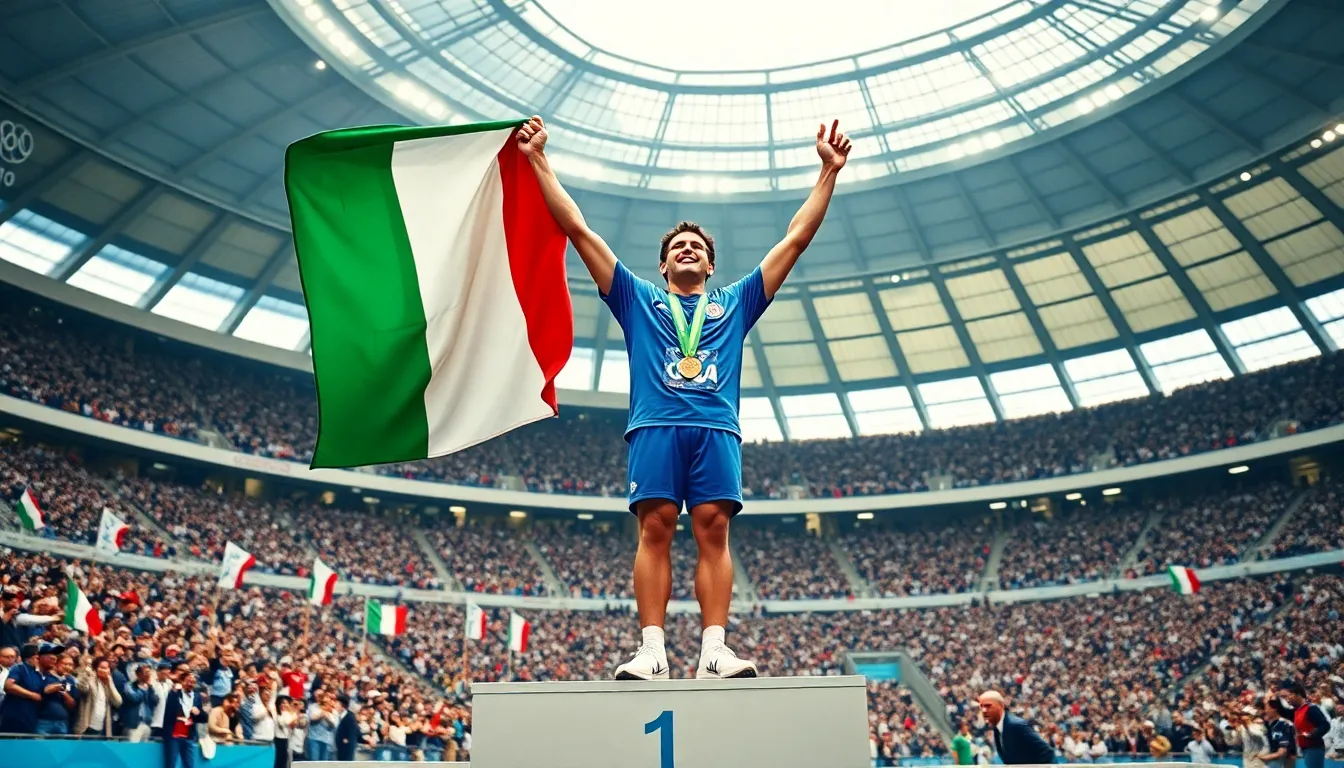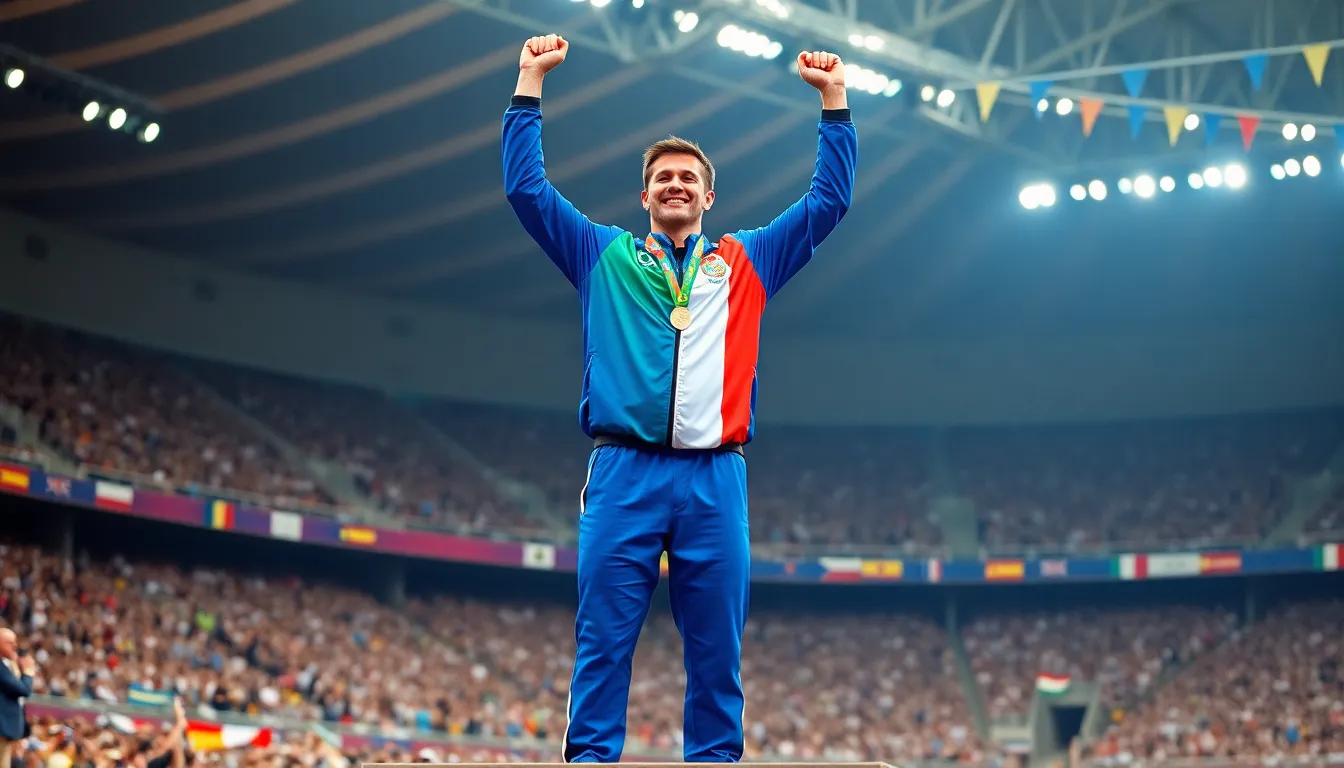Italy has long been a powerhouse in the Olympic arena, dazzling fans with its passion, talent, and a sprinkle of that famous Italian flair. From the thrilling sprint of a runner to the graceful dive of a swimmer, the country’s athletes have racked up an impressive medal haul that would make even the most seasoned trophy collector green with envy.
But what’s the secret sauce behind Italy’s Olympic success? Is it the pasta-fueled training regimens or perhaps the motivational speeches delivered over a plate of risotto? Whatever it is, one thing’s for sure: Italy knows how to bring home the gold, silver, and bronze. Join us as we dive into the fascinating world of Italy’s Olympic medals, uncovering the stories and triumphs that make this nation a true contender on the world stage.
Table of Contents
ToggleOverview of Italy at the Olympics Medals
Italy boasts a remarkable Olympic history, with a total of 742 medals as of the Tokyo 2020 Olympics. Gold medals account for 257 of this impressive total, highlighting the country’s prowess across various sports. Olympic participation began for Italy in 1896, making it one of the initial competitors in the modern Games.
Athletics stands out as Italy’s strongest discipline, contributing numerous medals over the years. The nation excels in events like sprinting and long-distance running, with athletes such asDorando Pietri and Fiona May achieving legendary status. Rowing also plays a significant role in Italy’s medal tally, with crews frequently reaching the podium.
Swimming adds to Italy’s success story, showcasing exceptional athletes like Federica Pellegrini. Her achievements include multiple Olympic medals, enhancing Italy’s reputation in the pool. Additionally, Italy’s participation in team sports has yielded remarkable results, with soccer and basketball making notable contributions to the medal count.
Various Olympic Games mark significant milestones for Italy. The 1936 Berlin Games saw Italy achieve a record number of medals, solidifying its status as a powerful contender. More recently, the 2008 Beijing Olympics showcased a revitalized Italian team, bringing home 36 medals.
Noteworthy is Italy’s performance in the Winter Olympics as well. Dominating in sports like skiing and ice hockey, athletes such as Alberto Tomba and Carolina Kostner stand out in their fields. Italy significantly contributes to the overall medal count across both summer and winter disciplines.
Overall, Italian athletes embody resilience, skill, and spirit, translating their dedication into medal success at the Olympics. Their stories resonate, inspiring future generations to pursue excellence on this global stage.
Historical Performance

Italy boasts a storied history in the Olympics, marked by impressive achievements and memorable moments. Their journey began in 1896, with Italy competing in the inaugural modern Games.
Early Participation
Early participation included athletes representing Italy at the 1900 Paris Olympics, where they won their first medals. The nation established itself as a competitive force, initially excelling in fencing and athletics. Athletes like Francesco Cavarretta and Carlo Airoldi captured attention, setting the stage for future success. As the Games progressed, Italy developed a broader array of competitive sports, strengthening its presence on the Olympic stage.
Significant Milestones
Significant milestones punctuate Italy’s Olympic history, showcasing remarkable performances. The 1936 Berlin Games stand out, where Italy secured its highest medal tally at that time—36 medals. Achievements in the 2008 Beijing Olympics further reinforced Italy’s prominence, with 36 medals earned that year alone. Legendary athletes like Fanny Blankers-Koen and Federica Pellegrini contributed to this impressive haul. Collectively, these milestones reflect Italy’s ongoing commitment to excellence in sports and the nation’s remarkable versatility across various disciplines.
Notable Athletes
Italy boasts numerous athletes who left an indelible mark on the Olympic stage. Their contributions significantly shaped Italy’s sports legacy.
Icons of Italian Sports
Francesco Cavarretta and Carlo Airoldi made headlines in early Olympic history. Cavarretta won multiple medals in fencing, laying a foundation for Italy’s strength in this sport. Airoldi excelled in rowing, another discipline where Italy historically thrived. Dorando Pietri, known for his dramatic finish in the 1908 London Marathon, became an icon due to his tenacity and spirit. Recognized for their achievements, these athletes inspired future generations to strive for success, making them integral to Italy’s sporting narrative.
Recent Stars
In recent years, Federica Pellegrini became a standout in swimming, securing multiple medals, including gold at the 2008 Beijing Olympics. Gianmarco Tamberi brought attention to high jumping with his striking performances, sharing Olympic glory in Tokyo 2020. Valentina Vezzali, a fencing legend, dominated her sport, amassing six Olympic medals throughout her career. These athletes exemplify Italy’s continuing excellence and resilience. With each Olympic cycle, they remind the world of Italy’s rich sporting heritage.
Medals by Year
Italy’s Olympic medal journey reflects the nation’s dedication to sporting excellence across different events and eras.
Summer Olympics
In the Summer Olympics, Italy amassed a total of 617 medals, including 204 gold medals. The 1936 Berlin Games marked a peak with 36 medals, showcasing Italy’s athletic prowess. The 2008 Beijing Olympics again illustrated Italy’s strong performance, as athletes secured 36 medals. Athletics stands out as Italy’s most successful discipline, supplemented by notable achievements in swimming, fencing, and rowing. Iconic competitors like Federica Pellegrini and Valentina Vezzali contributed significantly to this medley of victories. Italy consistently ranks among the top nations, reflecting both historical commitment and modern achievements.
Winter Olympics
Italy’s participation in the Winter Olympics also yielded impressive results, with a total of 125 medals, including 53 gold medals. Strong performances in skiing and ice hockey characterized Italy’s winter campaigns. The 2006 Turin Games were particularly memorable, as the home nation celebrated 28 medals, enhancing national pride. Athletes such as Armin Zoeggeler in luge and Carolina Kostner in figure skating exemplified Italian excellence on the ice. Through diverse winter sports, Italy continues to deliver memorable Olympic moments and aspiring champions.
Impact on Italian Culture and Pride
Italy’s Olympic successes foster a deep sense of national pride and cultural identity. Winning a total of 742 medals, including 257 golds as of the Tokyo 2020 Olympics, creates a shared celebration among Italians. Celebrated athletes become national heroes, inspiring younger generations and enhancing Italy’s reputation on the global stage.
Cultural events often embrace Olympic champions, integrating their achievements into Italy’s rich history. Urban areas host parades and celebrations, emphasizing the connection between sports and Italian heritage. Athletes like Federica Pellegrini and Gianmarco Tamberi exemplify values such as determination and teamwork, impacting youth empowerment and encouraging participation in sports.
Various sports showcase Italy’s versatility beyond traditional boundaries, highlighting talents in disciplines like fencing, swimming, and skiing. Historical accomplishments, particularly in events like the 1936 Berlin Games and the 2008 Beijing Olympics, reinforce Italy’s commitment to excellence. Schools and local clubs promote athletics, with community programs designed to encourage sporting spirit among children and teens.
Pride across the nation reflects when Italy competes, particularly during the Winter Olympics, which feature skiing and ice hockey. Success stories like Armin Zoeggeler and Carolina Kostner amplify support for winter sports, galvanizing fan engagement and participation. Through shared victories, Italian culture often embraces values such as unity, resilience, and joy, fostering a collective identity.
The impact of these Olympic feats resonates beyond the sports arena. Art, literature, and media increasingly showcase athletic achievements, celebrating the athletes’ journeys and contributions to society. As Italy continues to participate in the Olympics, the cultural significance of these events will likely deepen, embodying the spirit of a nation proud of its athletic legacy.
Italy’s Olympic journey is a testament to its rich sporting heritage and unwavering dedication to excellence. With a remarkable medal count that reflects the nation’s passion for sports, Italy continues to inspire athletes and fans alike. The blend of tradition and modern achievement showcases the resilience of Italian athletes who embody the spirit of competition.
As Italy looks toward future Olympics, the legacy of past champions will undoubtedly motivate the next generation to strive for greatness. The cultural significance of these achievements reinforces national pride and unity, making every medal a symbol of collective effort and determination. Italy’s commitment to sports will continue to shape its identity on the global stage.

